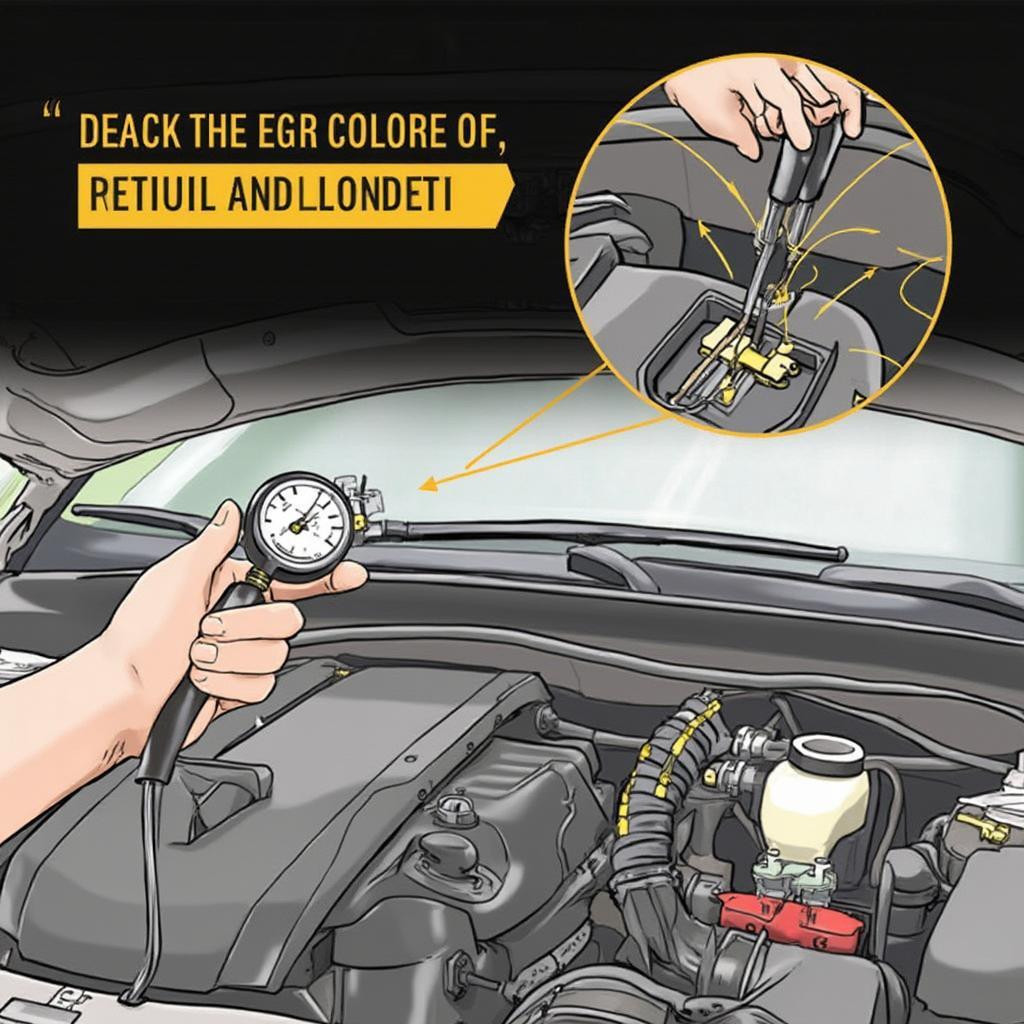The dreaded P0404 code. If you’re a Dodge owner, seeing this pop up on your OBD2 scanner can be a real headache. This code specifically refers to the Exhaust Gas Recirculation (EGR) system, and in this comprehensive guide, we’ll delve into everything you need to know about the dodge obd2 code p0404, from its causes and symptoms to diagnostic procedures and solutions.
Understanding the Dodge OBD2 Code P0404
The P0404 code indicates a problem with the EGR system’s range/performance. The EGR system plays a crucial role in reducing harmful nitrogen oxide (NOx) emissions by recirculating a portion of exhaust gases back into the intake manifold. This lowers combustion temperatures, thereby reducing NOx formation. When the P0404 code appears, it signifies that the Powertrain Control Module (PCM) has detected a problem within the EGR system’s operating range or its overall performance.
Common Causes of the P0404 Code in Dodge Vehicles
Several issues can trigger the P0404 code in your Dodge. Some of the most common culprits include:
- Blocked or Restricted EGR Valve: Carbon buildup can restrict the EGR valve’s movement, preventing it from opening and closing properly.
- Faulty EGR Valve Position Sensor: This sensor monitors the position of the EGR valve and relays this information to the PCM. A malfunctioning sensor can provide inaccurate readings, leading to the P0404 code.
- Vacuum Leaks: The EGR system often relies on vacuum pressure to operate. Leaks in the vacuum lines can disrupt this process and trigger the code.
- Wiring Issues: Damaged or corroded wiring in the EGR circuit can disrupt communication between the EGR components and the PCM.
- Faulty PCM: In rare cases, a malfunctioning PCM can be the root cause of the P0404 code.
Symptoms of the P0404 Code
While the check engine light is the most obvious symptom, other indicators might suggest a P0404 issue:
- Reduced Fuel Economy: A malfunctioning EGR system can negatively impact fuel efficiency.
- Rough Idle: The engine might idle erratically or stall.
- Engine Pinging (Detonation): This knocking sound indicates uncontrolled combustion within the engine cylinders.
- Increased NOx Emissions: A faulty EGR system can lead to higher levels of harmful NOx emissions.
- Lack of Power: You might experience a noticeable decrease in engine performance.
How to Diagnose the P0404 Code
Diagnosing the P0404 code involves a systematic approach:
- Retrieve the Code: Use an OBD2 scanner to confirm the P0404 code and check for any other related codes.
- Inspect the EGR Valve: Visually inspect the EGR valve for carbon buildup and check its movement.
- Check Vacuum Lines: Inspect the vacuum lines for leaks or damage.
- Test the EGR Valve Position Sensor: Use a multimeter to test the sensor’s voltage and resistance.
- Check Wiring and Connectors: Inspect the wiring and connectors for damage or corrosion.
 Mechanic Checking Vacuum Lines for P0404 Code
Mechanic Checking Vacuum Lines for P0404 Code
“Regular maintenance is key to preventing EGR issues,” says John Miller, a seasoned automotive technician with over 20 years of experience. “A simple EGR valve cleaning can often prevent costly repairs down the road.”
Fixing the P0404 Code
Depending on the diagnosed cause, the solution can range from simple cleaning to component replacement:
- Clean the EGR Valve: Carbon buildup can often be removed with a specialized EGR valve cleaner.
- Replace the EGR Valve: If cleaning doesn’t resolve the issue, the EGR valve might need replacement.
- Repair or Replace Vacuum Lines: Leaky vacuum lines should be repaired or replaced.
- Replace the EGR Valve Position Sensor: A faulty sensor needs to be replaced.
- Repair Wiring: Damaged wiring should be repaired or replaced.
Conclusion: Addressing the Dodge OBD2 Code P0404
The dodge obd2 code p0404, though potentially troublesome, is often manageable with proper diagnosis and repair. By understanding the causes, symptoms, and diagnostic procedures, you can effectively address this issue and restore your Dodge’s performance and efficiency. Don’t let the P0404 code keep you off the road.
“Addressing EGR issues promptly is crucial not only for performance but also for environmental responsibility,” adds Miller. “A properly functioning EGR system minimizes harmful emissions and contributes to cleaner air.”
FAQ: Dodge OBD2 Code P0404
- What does the P0404 code mean? It indicates a problem with the Exhaust Gas Recirculation (EGR) system’s range/performance.
- Can I drive with a P0404 code? While you might be able to drive, it’s recommended to address the issue promptly to prevent further damage.
- How much does it cost to fix a P0404 code? The cost varies depending on the specific repair needed, ranging from a simple cleaning to component replacement.
- How can I prevent the P0404 code? Regular maintenance, including EGR valve cleaning, can help prevent this code.
- What other codes are related to the EGR system? Other related codes might include P0401, P0402, P0403, P0405, and P0406.
- Is the P0404 code specific to Dodge vehicles? No, the P0404 code is a generic OBD2 code that can apply to various vehicle makes and models.
- Can a bad EGR valve cause other problems? Yes, a malfunctioning EGR valve can lead to issues like reduced fuel economy, rough idle, and increased emissions.
Need help with your Dodge OBD2 Code P0404? Contact us via WhatsApp: +1(641)206-8880, or Email: [email protected]. Our 24/7 customer support team is ready to assist you.